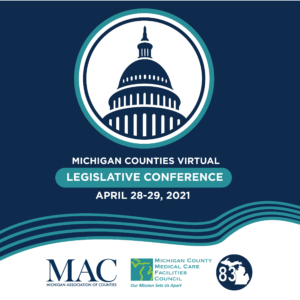How to navigate questions on in-person vs. hybrid vs. digital
 With state health orders reducing restrictions on indoor gatherings and hospitalization rates showing marked improvement in recent weeks, MAC has been fielding questions from members about moving out of purely virtual county board sessions.
With state health orders reducing restrictions on indoor gatherings and hospitalization rates showing marked improvement in recent weeks, MAC has been fielding questions from members about moving out of purely virtual county board sessions.
First, it’s important to remember two key dates in play about board meetings:
- March 31, 2021 – This is the last day that public boards can hold virtual sessions for “any reason” under provisions of the October and December 2020 changes to the state’s Open Meetings Act (OMA).
- Dec. 31, 2021 – This is the last day that public boards can hold virtual sessions IF they have adopted a State of Emergency (SOE) resolution. A template for such a resolution is on MAC’s COVID Resources Page.
Next, boards must navigate the competing requirements of public access under OMA with the restrictions on gatherings under orders from the Michigan Department of Health and Human Services (no more than 25 persons) and/or local health departments.
Scenario 1: In person meeting with no declared state of emergency after 3/31/21
If your county wants to hold an in-person session and posts it as in-person at a physical address (say, the courthouse), the county may not turn away members of the public who arrive to attend the open meeting. Of course, this could lead to rooms exceeding proper capacity under COVID health orders.
One options is to plan for overflow room(s) with two-way communication for members of the public. However, absent the authority for a virtual meeting (e.g. state of emergency declaration after 3/31) requiring the public to leave because of the capacity limitations would violate the OMA.
Scenario 2: In person meeting with a declared state of emergency after 3/31/21
If, however, your county has a state of emergency declaration in place after 3/31 and posts the meeting as “virtual” or “hybrid” then it can proceed with some county personal (including commissioners) in the courthouse while the public is required to participate via two-way remote connections. This would also afford commissioners the option to participate in the meeting virtually.
That does not mean a posted in-person public meeting may not permit the public to participate via Zoom (absent a state of emergency declaration after 3/31) but permitting/encouraging/requesting virtual participation is different from requiring it or otherwise turning the public away from an in person meeting.
As always, county boards are advised to consult with their corporate counsel to ensure procedures are following all relevant state laws.
Biden signs aid plan; Michigan counties get $1.95 billion
 Thursday afternoon, President Joe Biden signed the American Rescue Plan, a $1.9 trillion COVID relief package that will translate into $1.95 billion in direct federal aid to Michigan’s 83 counties.
Thursday afternoon, President Joe Biden signed the American Rescue Plan, a $1.9 trillion COVID relief package that will translate into $1.95 billion in direct federal aid to Michigan’s 83 counties.
Michigan’s amount is part of $65 billion in direct federal aid to counties across the nation.
See county-by-county estimates
“This is fantastic news for our members,” said Stephan Currie, executive director of MAC. “There’s a great deal still to learn about the specific of how the money is best used, but we are working with the National Association of Counties, which is working with the U.S. Treasury, to get such information assembled and out to members as quickly as possible.
See economic analysis by MSU Center for Local Government Finance & Policy
According to NACo’s tracking, counties could use these funds to:
- Respond to the public health emergency with respect to the COVID‐19 or its negative economic impacts, including assistance to households, small businesses and nonprofits, or aid to impacted industries such as tourism, travel, and hospitality
- Respond to workers performing essential work during the COVID‐19 public health emergency by providing premium pay to eligible workers of the county that are performing such essential work, or by providing grants to eligible employers that have eligible workers who perform essential work
- Make provision for government services to the extent of the reduction in revenue due to the public health emergency relative to revenues collected in the most recent full fiscal year of the county prior to the emergency (i.e., Jan. 20, 2020)
- Make necessary investments in water, sewer or broadband infrastructure
(It is important to note under the first bullet that the examples outlined are intended to clarify congressional intent that these activities would be eligible. However, state and local activities would NOT be limited only to these activities.)
Local governments would be required to provide “periodic reports” providing a detailed accounting of the use of funds.
Note that the NACo Clearinghouse page offers boxes to either pose questions to NACo staffers on the legislation and implementation, or to share your county’s stories about your challenges in accessing funds under the previous rounds of federal aid.
For the latest COVID-19 news affecting counties, visit MAC’s Resources Page.
Registration opens March 19 for virtual Legislative Conference
 Members can begin registering on March 19 for the Michigan Counties Legislative Conference, April 28-29, and co-sponsored by MAC and the Michigan Counties Medical Care Facilities Council (MCMCFC).
Members can begin registering on March 19 for the Michigan Counties Legislative Conference, April 28-29, and co-sponsored by MAC and the Michigan Counties Medical Care Facilities Council (MCMCFC).
The event will be all virtual and include 12 workshops for MAC members and four for members of MCMCFC.
Among topics to be addressed are:
- The county apportionment process for drawing commissioner district lines
- Decoding legislative terminology to better understand the work at the State Capitol
- Options for local government finance reform
The conference also will have three plenary sessions for all attendees.
Please keep a watch on your email accounts for notices about the event and registrastion. You also can check for updates on MAC’s conferences webpage.
House committee backs MAC-opposed mandate on courts
 A bill that would impose a new unfunded mandate on counties by requiring online filing and accessibility in local courts moved to the House floor this week.
A bill that would impose a new unfunded mandate on counties by requiring online filing and accessibility in local courts moved to the House floor this week.
House Bill 4164, by Rep. Ryan Berman (R-Oakland), passed out of the House Oversight Committee, chaired by Rep. Steve Johnson (R-Kent), with an 8-1 vote. The version that passed committee would require courts to make the register of actions and “a digital image of all documents filed in any case in that court” accessible to the public for free via a website.
MAC and Michigan Association of County Clerks opposed the original version, which only allowed attorney online access, and both groups remain opposed to the committee-passed version. No funding is attached for court technology enhancements or for any staff time that would be necessary to meet the requirements under the bill within the given timeframe.
The bill gives courts until Jan 1, 2023, to meet the new digital accessibility requirements. If the state e-file system is not fully implemented by this time, with state funding, there would be a patchwork of planning at the local level and likely later changes to transition to the state Mi-File system again.
The State Court Administrator’s Office also opposed the bill, finding it is a separation of powers violation. Additionally, the state court administrator has previously explained the ongoing roll-out of the MI-File process could be expedited with additional funding and support from the Legislature.
Counties cannot endure another unfunded mandate or support a bill based on funding promises.
For more information on this issue, contact Meghann Keit-Corrion at keit@micounties.org.
Senate-approved tax-exemption bill nears passage in House
 A bill opposed by MAC to extend a property tax exemption on broadband equipment moved to the House floor this week.
A bill opposed by MAC to extend a property tax exemption on broadband equipment moved to the House floor this week.
The House Committee on Communications and Technology advanced Senate Bill 46, by Sen. Aric Nesbitt (R-Van Buren), which passed the Senate in February on a 20-15 vote.
The premise behind the legislation is that the true barrier to broadband expansion in Michigan is the cost of personal property taxes (PPT) on the equipment.
MAC disagrees with this assumption and instead points to the cost of the equipment and labor required to install the lines down a long stretch of rural highway. It is simple economics that the providers are not building in rural areas because there are not enough customers to ensure a decent rate of return on the investment.
Local units of government are dependent on property taxes to provide services mandated by the state and needed by our residents. These services only can be delivered if we have revenue to do so. Yet the trend in Lansing is to trade local government revenue for tax breaks to private businesses. It is much easier for those at the state level to forgo property tax revenue since the state relies far more on income and sales tax dollars.
MAC will continue to work with the bill’s proponents but remains in opposition to the existing language.
For more information on this issue, contact Deena Bosworth at bosworth@micounties.org.
 Podcast 83 to discuss Capitol activity over previous week
Podcast 83 to discuss Capitol activity over previous week
The Podcast 83 team will continue its weekly reviews of legislative activity in Lansing and Washington, D.C., on Monday, March 15 at 3 p.m.
Click here to register for the live event, which will include a Q&A session on all of the hot legislative topics.
Members can view any previous episode of the Podcast, sponsored by DTE Energy, on the podcast webpage.
MSU Extension offers ‘County Café’ learning sessions in March, May
 Visits to the local café often lead to discussion about current issues. The County Café will be no different (except that it’s on Zoom). This follow-up program to the MAC-MSUE New Commissioner School is designed to bring together both experienced and new commissioners and county leadership; present some current topics of relevance to county government; and give you a chance to talk about how these topics might impact your county and actions you can take to make the impact more positive. There will also be an opportunity for discussion following the presentation.
Visits to the local café often lead to discussion about current issues. The County Café will be no different (except that it’s on Zoom). This follow-up program to the MAC-MSUE New Commissioner School is designed to bring together both experienced and new commissioners and county leadership; present some current topics of relevance to county government; and give you a chance to talk about how these topics might impact your county and actions you can take to make the impact more positive. There will also be an opportunity for discussion following the presentation.
These are free sessions and open to all commissioners and other county officials, but you must register at the link below to participate.
March 18, 3 p.m.-4:30 p.m. EST – Michigan’s Economic Outlook and Its Impact on County Government
The economic uncertainty brought on by the COVID-19 pandemic has created challenges for many local governments. As counties face significant budget decisions this year and going forward, working with the best information possible is an important piece of moving towards fiscal sustainability. Dr. Eric Scorsone, director of the MSU Extension Center for Local Government Finance and Policy, will present on Michigan’s economic outlook and its impact on county government.
May 6, 11 a.m.-12:30 p.m. EST – Counties Supporting Regional Economic Development
Counties are important economic development entities in Michigan. Yet successful economic development depends on collaboration, partnerships, and regional approaches. The MSU Economic Development Administration (EDA) University Center for Regional Economic Innovation (REI) leverages higher education assets in collaboration with communities to support the co-creation, co-implementation, and dissemination of new and innovative economic development strategies.
To advance Michigan’s long-term economic recovery from COVID-19, REI was awarded CARES Act funding in summer 2020 to establish a Comprehensive Economic Recovery Initiative (CERI). CERI will allow REI to leverage higher education assets to work with local businesses, governments, nonprofits, economic developers, and others to develop new economic development strategies, document new economic development practices, and provide technical assistance to hard hit communities to facilitate action focused projects under four pillars: Resiliency Planning, Financial Resiliency, Circular Economies, and 21st Century Communications Infrastructure.
Join Jennifer Bruen of the MSU REI to learn about CERI, technical assistance, and partnership opportunities to advance regional economic development in Michigan.
To register for either event, visit: https://events.anr.msu.edu/countycafe21/.
Monroe administrator briefs House panel on court funding
 At the panel’s invitation, Monroe County Administrator Michael Bosanac testified on trial court funding before the House Appropriations Subcommittee on the Judiciary this week. As the MAC representative on the statutorily created Trial Court Funding Commission, Bosanac provided the committee a high-level overview of the general revenues available to support the 242 trial courts in Michigan.
At the panel’s invitation, Monroe County Administrator Michael Bosanac testified on trial court funding before the House Appropriations Subcommittee on the Judiciary this week. As the MAC representative on the statutorily created Trial Court Funding Commission, Bosanac provided the committee a high-level overview of the general revenues available to support the 242 trial courts in Michigan.
While court funding reform is not a new topic for MAC, or in Lansing, the looming statutory sunset of October 2022 on courts’ ability to levy fees will hopefully encourage lawmakers to act on recommendations set forth in the commission’s report. Rep. Sarah Lightner (R-Jackson), the subcommittee’s chair, has introduced House Bill 4447, which would take a first step toward streamlining the county/state funding process. The bill would remove the reimbursement process in which a county receives judicial salary funds from the state and make the full funding of judge salaries a direct state responsibility.
The Legislature also continues to focus on court data collection and supporting a more centralized and efficient system, both areas that Bosanac endorsed for attention in his testimony. He emphasized that the size of the challenge requires a phased approach over time, with the state and counties working in a close partnership.
To see video of the hearing, click here.
For more information on this issue, contact Meghann Keit-Corrion at keit@micounties.org.
 Staff picks
Staff picks
- Impact of COVID-19 on the Local Jail Population, January-June 2020 (U.S. Department of Justice)
- How 18 million Americans could move into rural areas – without leaving home (Route Fifty)
- Great Lakes Sediment and Nutrient Reduction Program (Great Lakes Commission)
- 2021 March Madness: Complete schedule, dates (NCAA.com)
